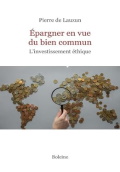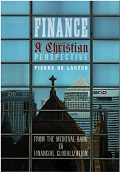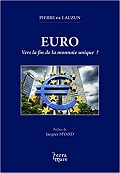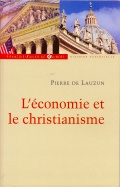


Derniers commentaires
- Un commentaire sur :
Sans titre
- Un commentaire sur :
Sans titre
- Un commentaire sur :
Sans titre
- Un commentaire sur :
Sans titre
- Un commentaire sur :
Sans titre
- Un commentaire sur :
Sans titre
- Un commentaire sur :
Sans titre
- Un commentaire sur :
Sans titre
Mettre les marchés financiers au service du Bien commun
dimanche 16 juin 2013
FINANCIAL MARKETS SERVING THE COMMON GOOD
A Christian perspective
In an economy built around the human person, decisions should be made responsibly by those persons, with in view the common good. The economic interaction of persons is what is called a market. The market is therefore a form of expression of society.
In this respect Pope Benedict XVI made a very important statement for our purpose. We find in Caritas in veritate N° 36 : « The Church has always held that economic action is not to be regarded as something opposed to society. In and of itself, the market is not, and must not become, the place where the strong subdue the weak. Society does not have to protect itself from the market, as if the development of the latter were ipso facto to entail the death of authentically human relations. Admittedly, the market can be a negative force, not because it is so by nature, but because a certain ideology can make it so. It must be remembered that the market does not exist in the pure state. It is shaped by the cultural configurations which define it and give it direction. Economy and finance, as instruments, can be used badly when those at the helm are motivated by purely selfish ends. Instruments that are good in themselves can thereby be transformed into harmful ones. But it is man’s darkened reason that produces these consequences, not the instrument per se. Therefore it is not the instrument that must be called to account, but individuals, their moral conscience and their personal and social responsibility ».
In particular, the role of financial markets is to confront bids and offers for capital investments, lending instruments and hedging of risks. As any human institution, in the light of the Social Teaching of the Church (STC) financial markets are to serve the Common good. Subsidiarity implies the autonomy of participants to the market, taking into account their duty towards the Common good ; and society is responsible for helping to insure the Common good by devising the appropriate framework.
In addition to giving the possibility of buying and selling in the framework of a global confrontation of bids and offers, a market gives a common reference to society, which is called a price. Reflecting the priorities and expectations of all participants to society, an open and fair market produce a just price, provided the organisation of the market is satisfactory and the priorities of participants are reasonably well-oriented. Our predecessors the medieval Schoolmen, following the lead of saint Thomas Aquinas, had already contributed actively to the questions we raise here, starting with the just price.
Our aim here is not to define precise measures when there is no specific moral or ethical dimension to them, but to try and give orientations towards a better integration of financial markets in a social environment aiming at the Common Good. What has been said implies that two areas are to be considered : the organisation of markets and the priorities of participants. In this respect, the following questions should be raised (and others if useful).
Questions
Organisation and rules
1. Do we endorse the view that markets being the expression of society should be as transparent, equal and open to all investors as is possible ?
o Do we think this implies giving a strong preference to organised markets (or to OTC markets delivering an equivalent result in this respect) ? If so, what should be the status of other OTC markets (limited role, higher prudential requirements) ?
o How can High Frequency Trading be coherent with this vision of the market ? Dark pools and other forms of hidden and non-participative markets ?
o Shouldn’t opaque and oligopolistic markets (like CDS markets) be deeply reformed ?
2. According to the preceding view (and the STC), markets would have to be regulated and organised.
o Markets must be regulated and subject to appropriate surveillance. Who should have the responsibility to organise and monitor these markets ? Isn’t subsidiarity going in favour of self-regulation by the industry, notably by codes and other rules, subject to official scrutiny and/or approval ?
o The market being international, doesn’t this imply some form of international authority at least on common references and major international markets (including of course commodities) ?
o What kind of infrastructure (exchanges, clearing and settlement platforms) do the markets need ? Who should own them ? Wouldn’t subsidiarity be best respected by cooperative arrangements between participants under public scrutiny ? Aren’t those platforms instruments of common good and shouldn’t they centralise transactions ?
3. In some cases, new financial products may have to be considered as detrimental to the integrity of the markets (and/or of investors) and, as we saw in 2007 the markets cannot immediately make an appropriate and timely valuation of these risks. Then :
o Shouldn’t there be an authorisation process for those products, if significant collectively – as is the case now for the issuance of stocks or bonds ?
o Shouldn’t there be limits (or prohibition) to the use of hedging instruments where there is no asset to hedge (except in case of regulated market-making) ? Shouldn’t it be in priority the case of CDSs and commodities derivatives ?
4. Financial transaction tax
o Can such a tax work if not worldwide (an unlikely event) ?
o Being a blunt and rough instrument, is taxation adapted to regulate markets ? Is not direct regulation a much more refined and adapted tool ?
o If the financial sector must contribute more to financing public expenditure, aren’t other fiscal bases much more simple and more adapted (e.g. taxes on profits, on risk-weighted assets etc.) ?
Priorities
1. The market being the interaction of people, its end result depends on the priorities of its participants. And so :
o What should be the priorities of investors, from a Common good perspective ? Does not that imply a variety of criteria, not limited or short term profit ? Shouldn’t all investments be responsible or ethical investment ?
o Is ‘ethical’ in this respect limited to the criteria currently used to assess companies where to invest (environment, labour, governance) ? Shouldn’t it be enriched (quality and utility of products, relationship to clients and investors, responsibility to the communities where a company is active etc.) ? Shouldn’t Catholics be active proponents of instruments to achieve this aim (ratings, financial research etc.) ?
2. Governance of investment instruments is a vital priority.
o Shouldn’t for example pension funds be managed more explicitly in a long term perspective, taking into account some consideration of the Common good ?
o Shouldn’t they therefore avoid benchmarks based on market indices (which are short term by nature) ?
o Shouldn’t Christians have specific initiatives here again ?
3. For all participants, buying and selling mean sending signals to the market, and so express a statement of value for which one is responsible. And then :
o Aren’t financial intermediaries (banks, brokers, insurance fund management etc.) at least morally responsible for their action on the markets (as they are or should be for their products) ?
o How to elaborate new sets of priorities by these actors in order to influence the broad market or at least to behave morally ?
o Shouldn’t Christians have specific initiatives here again ?
2 Messages de forum
Besoin de réaliser votre site internet ? - Conception & réalisation du site : WIFIGENIE.NET
 Envoyer à un ami
Envoyer à un ami Imprimer
Imprimer





















